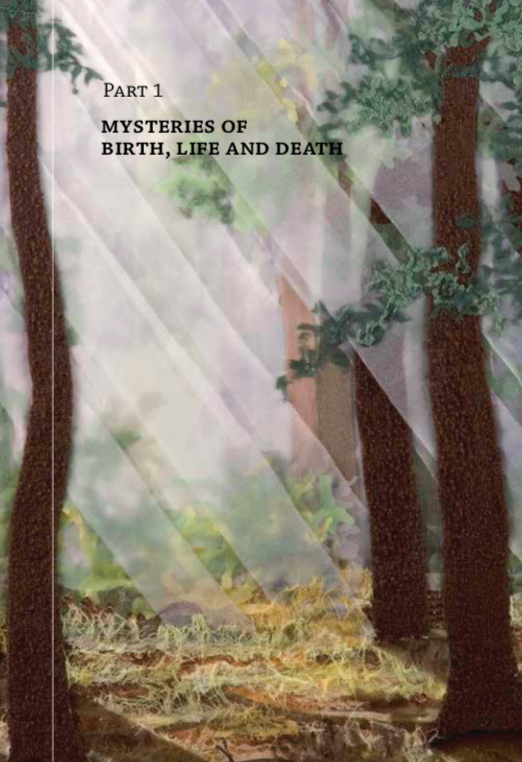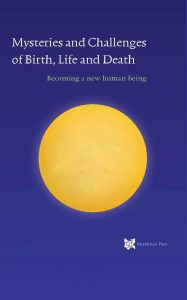I do not believe in death: I die by the hour, each day And I have found a higher, better life this way
Angelus Silesius,
Cherubinischer Wandermann I, 30a
Life and death are mysteries. What does this mean? A mystery is not a problem or puzzle for which we have to find a solution. A mystery has an unfathomable depth and every time we engage with it, our wonder of it grows. But, as the classical philosophers taught us, wondering leads to wisdom, while solving a problem only means an increase in knowledge. So, if we want to connect with the Sophia, the Wisdom, if we long to be ‘loved by it’ (which is the literal meaning of the word philosophy), we must turn to the mysteries.
Why would we want to love Wisdom and, conversely, want to be loved by her? Who is she? Jacob Boehme tells us that she shows us the gate that gives access to the Patrimony (Drey Principien – Three Principles xx, 40). Only through this gate can we properly enter the “world of light” and eternal life. If we allow ourselves access to that world on our own power, then it no longer remains a paradise. ‘The Alchemical Wedding of Christian Rosycross’ relates how, on the second day of Christian’s adventure, there were many there who were not invited to the wedding of bride and groom at all, having climbed over the walls to come into the castle. In the end, however they are all condemned and sentenced. This refers to the well-known Bible text: ‘Truly, truly, I say to you, he who does not enter by the door into the fold of the sheep, but climbs up some other way, he is a thief and a robber’ (John 10:1).
Wisdom must help us find this door. If we force it with our own hands or on the basis of our own knowledge, then we will become entangled in our own ideas, theories and illusions.
All our knowledge of life and death can only be of a provisional nature. It consists of earthly concepts that are at best a very poor shadow of the fullness of the symbolic reality of the heavens. If we want to fathom them, the mysteries of life and death cannot be translated into ordinary language or through our common thinking ability. If we were to do this, we would turn them into ordinary theories that are powerless to direct our lives. Instead of giving us access to the reality of Wisdom, they would shut us off, because we might think that we have already found the solution to the mystery.
Wisdom points us upwards, but not in a spatial sense because it has nothing to do with chronological time and physical space, nor with evolution or with journeys to distant galaxies. It points to a different reality and a different level of consciousness than that of our daily lives. That reality cannot be captured in ordinary concepts and language but is revealed to us by means of ancient symbols that we can find in all cultures and all authentic spiritual traditions. Each of these symbols is an entrance into the heavenly reality, provided we have learned to allow them entrance into our own lives. And for that we need Wisdom.
Only if this Wisdom loves us, and if we love her, can we learn to realise the depth of these symbols instead of merely understanding them. Our comprehension grasps only an extremely selective part of reality by means of concepts. Our comprehension – termed ‘the passive intellect’ in classical philosophy – receives and includes symbolic reality and reflects this to us as awareness. But first our comprehension must be awakened by Wisdom. After all, this ability has to do with love, receptiveness and the heart. The feverish activities of our ordinary mind and of our psyche, or personality, must first come to rest before the passive intellect opens to embrace the heavenly, symbolic reality. Then the mysteries will reveal themselves to us more and more – a process that never ends.
We are so fused with our psyche and our thinking that we have forgotten that we are receptive enough to receive Wisdom only when they have come to rest. When we succeed in becoming silent inside, we quickly notice how thoughts, feelings, impulses, fantasies, emotions, etc. come and go, whether we want them or not. Yes, sometimes we manage to create an apparent calm for a single moment, after which thoughts and feelings will breeze through us again in full force. Since it is apparent that we are not able to stop this flow, we have to conclude that we ourselves are not the main source of all those thoughts, feelings, and so on. That is an extremely important observation, because it immediately raises the question of who we really are if we are not the ones who produce all these thoughts, fantasies, impulses and the like.
Most spiritual traditions tell us in a variety of ways that we have to make a distinction between the ‘outer man’ and the ‘inner man’. In virtually all medieval texts, the outer man is identified with the ‘body’, with the result that we interpret this to mean our biological body. With a few exceptions, however, this is not the case. Then they meant what we nowadays call the ‘personality’, i.e. the indivisible unity of psychic, mental and biological processes. The ‘inner man’ was often called the ‘soul’ or ‘psyche’, but under the influence of the psychology of Freud and Jung these words mostly mean the outer man. Therefore it is often difficult to properly understand the old texts!
The outer being is inseparable from the earthly world, which includes not only biological and physical aspects but also the psychic and mental processes. This outer man is dominated by the ‘prince of the world’ and almost all of our thoughts, feelings, desires, and so on find their origin in his world. Because we constantly identify ourselves with all these processes, we believe that we are our thoughts, our feelings and our desires. Consequently if we were to become silent, if we were to stop identifying with our ordinary thinking and our ordinary fantasies, then we would feel that we were fading and vanishing.
The inner human being belongs to heaven and therefore continually lives in a symbolic reality that sometimes, very occasionally, permeates our consciousness, for example through symbolic dreams or through certain forms of contemplation. In both cases the outer person has more or less calmed down: either she is asleep, or she has learned to no longer identify with all sensory, psychological and mental processes. Then passive intelligence is able to pass on its comprehension of the symbolic reality to the outer being. Formulated differently: it is as if we went through the gate of sleep or through the gate of contemplation and were allowed to be in paradise for a moment.
However this heavenly reality can pervade the outer being’s awareness only when he or she has learned to live with symbols, to live with mysteries, and thus no longer tries to understand them with the ordinary thinking ability. For the concepts that have been developed by us are incapable of rightly expressing the mysteries which are opened, and thus become ‘present’, through these symbols.
Between the inner and the outer man there is an ‘abyss’ – at least as seen from the standpoint of the outer being. The inner man includes the outer man, but the reverse is not the case. If our outer man dies, we will therefore not go anywhere, because the inner man already is in heaven. It has, however, become impossible for him to express himself on earth through the outer man. Thus it follows that with every transition from the outer to the inner man (and from this world to paradise), we have to pass through a door. This is a form of death for the outer man, time and time again. That is why Angelus Silesius admonishes us ‘to die every hour’ thereby receiving the celestial life-force again and again.
Nothing is more difficult than this art of daily dying. Like all other arts, this requires continuous attention under the guidance of someone who has already taken some steps in this direction. All authentic religious traditions emphasise that it is not about fleeing from the world and storming the gates of heaven as quickly as possible, because then we are as the thieves and robbers mentioned in the Gospel of John. It is about becoming a gatekeeper, a mediator between heaven and earth, and therefore also a mediator between the inner and the outer man.
Only in this way can we die every day and so be born again. Only then are we able to encompass the Mysteries and present them today in this world, helping others to find the right gate. Then we must be philosophers – a being loved by Wisdom – and be willing to undertake the difficult and perilous journey that Christian Rosycross travelled in ‘seven days’. This journey does not have the purpose of becoming a resident of heaven but instead is one that prepares us for the important task of being a gatekeeper.
For which door or gate?
For the gate of the Mysteries.
Daniël van Egmond Bithoven, 2017
Source: Mysteries and Challenges of Birth, Life and Death

